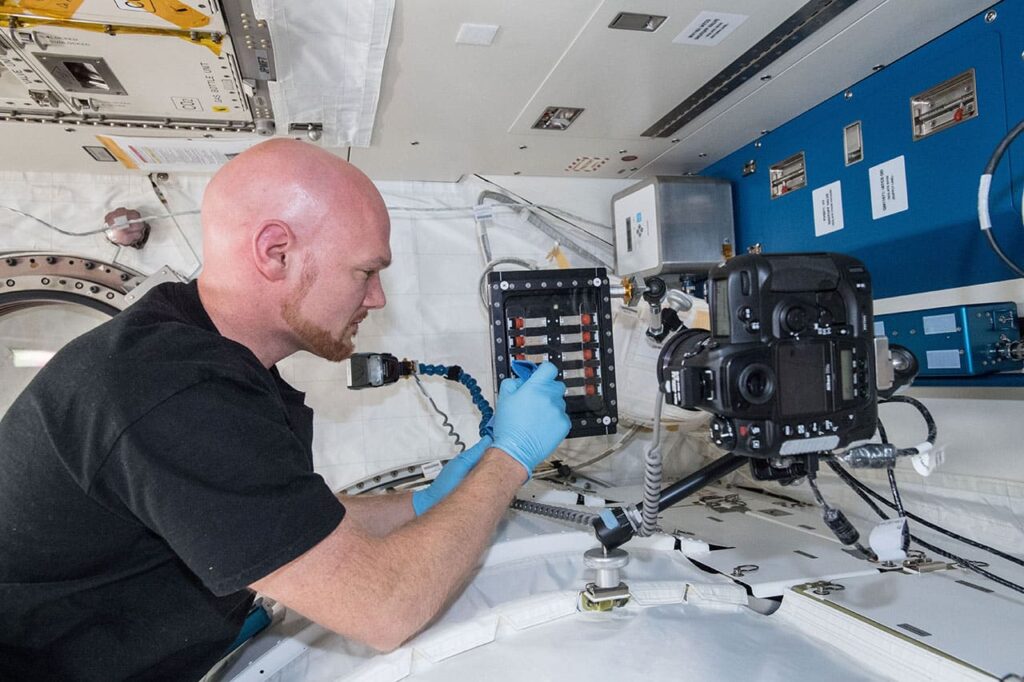Binary Colloidal Alloy Test
Short Name:The short name or acronym of the facility. BCAT

Facility Description
The Binary Colloidal Alloy Test (BCAT) hardware is retired and unavailable. Please see the additional information section below for currently available ISSInternational Space Station hardware and facilities that can support similar investigations.
The BCAT series of investigations studied the formation of crystals from colloidal particles. Samples were mounted on the Maintenance Work Area (MWA) and imaged using EarthKAM hardware and software with the onboard Kodak 760 camera. The persistent microgravityThe condition of perceived weightlessness created when an object is in free fall, for example when an object is in orbital motion. Microgravity alters many observable phenomena within the physical and life sciences, allowing scientists to study things in ways not possible on Earth. The International Space Station provides access to a persistent microgravity environment. environment of the ISS enabled the removal of gravitational sedimentation and buoyancy-induced mixing, allowing researchers to study how the colloids order to form crystals.
Availability:The general availability status of the facility. Not available. Please contact the facility manager with any questions.
ISS Environment:The facility location (internal or external to the ISS.) Internal
Owner:The entity that owns the facility. NASA
Operator/Implementation Partner:The entity or ISS National Lab Implementation Partner that operates the facility.
NASA
Developer(s):The entity, or entities, that developed the facility.
ZIN Technologies
Facility Manager:The name of the facility manager and their organization.
John McQuillen,
NASA Glenn Research Center
Manager Email:The facility manager's email address.
john.b.mcquillen@nasa.gov
Parent Facility:Any facility that is necessary to operate the facility described on this webpage. i.e., a parent facility is one level higher in the operational hierarachy. MWA
Child Facility:Facilities that can be operated within the facility described on this webpage.
Sponsoring Space Agency:The government space agency that sponsors investigations that use the facility. NASA
Equipment Category:"The facility's ISS National Lab equipment designation type. Designations include:
1. ISS National Lab Commercial Service Provider (CSP) Facility
2. Support Hardware
3. Capability Capability
Additional Information:Additional resources to learn more about the facility.
Below are three recent ISS investigations involving the dynamics of colloidal suspensions.
Bimodal Colloid – using the KERMIT microscope
Active Colloids in Microgravity – using TangoLab
MaRVIn-TABOOS – using MaRVIn
Past BCAT investigations on NASA’s SSRE
BCAT-3-BA
BCAT-3-SC
BCAT-3-4-CP
BCAT-4-Poly
BCAT-5-3D-Melt
BCAT-5-PhaseSep
BCAT-5-Compete
BCAT-5-Seeded Growth
BCAT-6-Phase Separation
BCAT-6-Colloidal Disks
BCAT-6-Seeded Growth
BCAT-6-PS-DNA
BCAT-C1
BCAT-KP-1-Shelf Life
BCAT-KP-1-Critical Point
More information from NASA’s Glenn Research Center
BCAT
iss056e098995 (July 26, 2018) --- Astronaut Alexander Gerst of ESA (European Space Agency) works inside the Japanese Kibo laboratory module taking pictures of samples for the Binary Colloidal Alloy Test-Cohesive Sedimentation investigation (BCAT-CS). The fluid physics research explores the sedimentary properties of quartz and clay particles. Mixed quartz and clay samples are suspended in a liquid for photographic and video downlink to scientists on Earth helping guide future geological studies of unexplored planets and improving petroleum exploration here on Earth.
